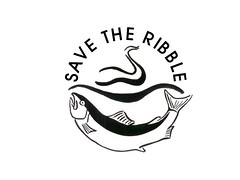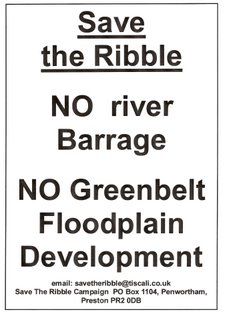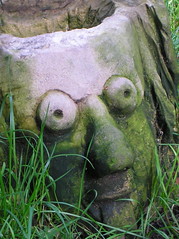Ribble Fisheries Consultative Association Oppose Ribble Barrage
The body responsible for Angling interests on the Ribble - and consequently concerned with the health of the River Ribble and its ecosystem - have published their position paper regarding the Ribble barrage proposal.
The Ribble Fisheries Consultative Association are unreservedly opposed to the Ribble barrage scheme as they argue that "The building of a barrage across the Ribble most certainly constitutes the greatest threat yet to migratory fish and would irrevocably change the ecology of the whole river system."
Their position is strongly supported by the Anglers Conservation Association (ACA), whose own position opposing the Ribble barrage is also published below the RFCA position statement.
'RIBBLE FISHERIES CONSULTATIVE ASSOCIATION
PROPOSED RIBBLE BARRAGE – POSITION PAPER
WHO ARE WE?
The RFCA is the umbrella organisation that represents angling interests on the Ribble Catchment. We represent the majority of angling clubs and riparian owners on the Ribble Catchment. We have close links with the Lancashire Consultative, primarily interested in the lower river, the Hodder Consultative and the Ribble Catchment Conservation Trust, tasked with habitat improvement. We have close links with the Environment Agency and currently sit on the committee responsible for the Salmon Action Plan. We are a participant in all consultations involving the riverine environment, water framework directive and any legislation affecting angling. We actively lobby MPs and Government Ministers on anything relating to the above
WHY WE ARE OPPOSED TO A BARRAGE ACROSS THE RIBBLE.
Historically.
When one looks at the history of barrages in England and Wales they have all been detrimental to migratory fish. If we take the last two built as an example. In the Cardiff Bay barrage the Council is facing an annual bill of £20m to attempt to put right environmental damage caused by the barrage. In the case of the Tees the barrage delays the passage of migratory fish thus creating a focus of predation and this matter is subject to a case brought by the ACA.
Salmon Stocks.
If one looks at the current status of English and Welsh stocks we see the following:
“Of the 62 principal salmon rivers 18% are currently (2006) achieving their management objective of exceeding the conservation limit four years out of five, and 19% are considered ‘probably not at risk’ (that is, there is a 50%-95% probability of the river complying). There is a similar percentage, which have a probability between 5 and 50% of complying and are considered to be ‘probably at risk’. There are currently 44% of rivers ‘at risk’, having less than a 5% probability of meeting their management objective.”
(A summary of the status of spring salmon stocks in England and Wales at April 2007)
Against this context the Ribble is one of the premier game fishing rivers in England and Wales. Each year in the E.A. Catch statistics the Ribble comes in the top six rivers for salmon, and unusually, also for sea trout. The Ribble is of major importance in the Environment Agencies fight to meet targets for salmon survival.
The Ribble was one of five pilots set up to pioneer Salmon Action Plans and is currently piloting a carcass tagging scheme for the E.A., which is expected to become a national scheme within a few years. A barrage would inevitably create a situation where the above would be put at risk as would the national targets.
Wild Atlantic Salmon.
The salmon is currently the 10th most threatened species in Europe. “The salmon is listed under the European Community Habitats Directive as a species requiring protection. It is amongst those wild species that Member States must maintain at, or restore to a favourable conservation status.” (Better Salmon and Sea Trout Fisheries 2008 –2021)
Much of the inter-tidal habitat in the Ribble estuary has Natura 2000 and Ramsar status.
The importance of the Ribble catchment is emphasized by the fact that it is the pilot basin for the implementation of the EU Water Framework Directive in the UK.
“Salmon migrate from our waters to feed as far away as West Greenland. Their fate is affected by influences in the marine environment and potentially by fisheries operating at various points along their migration. Through the UK Government, we support the European Union delegation to the North Atlantic Salmon Conservation Organisation (NASCO). We aim to support the conservation and rational management of salmon across the North Atlantic through agreements reached in this forum.” (Better Salmon and Sea Trout Fisheries 2008 –2021)
We strongly believe that a barrage across the Ribble would be against these initiatives and put at risk the survival of the Ribble salmon.
Sea Trout and other species
The sea trout is rapidly becoming a species under threat nationally and measures are currently being discussed to promote the improvement in the sea trout fishery.
The lower River is also a noted coarse fishery, probably the main one in the North West. A separate paper produced mainly by the Lancashire Consultative is recommended for a more detailed study of this fishery. It is entitled “The Lower Ribble as a fishery from the 60s to 2007 and the future”
Significantly, the Irish Sea and the estuary are recognised spawning and nursery areas for the sole and bass together with a recognised shellfish and prawn fishery.
We strongly believe that a barrage across the Ribble would be prejudicial to the safeguarding and development of these species.
Wider Environmental Issues.
· Siltation - The problem of debris and silt brought down the river is widely acknowledged as one of the contributory factors in the demise of the old docks. There was a constant need for dredging to maintain a channel. The Ribble continues to have a major siltation problem which is recognised by the E.A. in its flood defence reports, particularly as a result of increase “runoff” and increased drainage in the upper catchment. A barrage would merely add to this problem by allowing sedimentation to build up against it.
· Water quality - one of the intentions of the proposed barrage is to create a large area of still water. Any reduction in the amount of dissolved oxygen coupled with a greater length of almost still water would be detrimental to migrating fish especially during hot weather when there were low flows in any case. A considerable length of low flowing water would be susceptible to “bloom” – further reducing the amount of dissolved oxygen. In addition, it will provide a breeding ground for flies, midges and algae – thus creating a health and safety issue. Should the siltation turn to mud the river would be present a potential hazard for anyone venturing into the river.
Although the quality of the Ribble water has improved in recent years it must be recognised that the Ribble drains both rural and urban areas – each with their own particular pollution problems – including nitrate run off, agricultural pollution, industrial effluents and sewage discharges. The large area of almost still water created by the barrage would act as a depository for such pollutants thus creating a potential health and safety problem.
If the barrage was above any polluted influx of water (e.g. Savick Brook) there would be less water to dissipate this pollution causing a reduction in the water quality beyond the barrage.
· Flow - The flow behind the barrage would be seriously reduced as indicated above. In addition, the flow from the barrage into the estuary will be significantly changed and therefore pose difficulties for fish coming back to the river as they rely on the outflow to find their way and determine the best time to “run”.
· Flood Defence –The potential for flooding is posed by the drainage of the catchment and any lifting of the water level will create potential flooding problems at times of heavy rainfall as much of the flood plain will have been flooded already. There are currently storm and sewage outfalls that are causing problems as they fall below the now increased flood height of the river caused by the increased drainage of the upland areas.
· Erosion – the increase flood height throughout the catchment caused by improved drainage of the upland areas means that the river rises much quicker, causes significant additional erosion to the banks to be deposited behind the barrage. A barrage would inevitably effect estuary currents and thus increase the likelihood of erosion of the adjacent coastline. This would have an impact on the internationally designated wetlands and marshlands of the Ribble estuary.
. Smolts - Much of what we have been saying refers to the adult salmon. A barrage would present enormous problems for migrating smolts at a time when they would be at their most vulnerable - just as they adapt to life in salt water by the displacement of the mesohaline zone.
Economics
The annual value of the Ribble fishery in terms of rod caught salmon is estimated at between £8.5 million and £11 million. On top of this one could put the seatrout catch, which most years is considerable. There is also a small estuary netting arrangement which is guaranteed by the 1975 Salmon and Freshwater Act. In Salmon Conservation terms the Ribble is a major part of proceedings in England and Wales. Clubs, riparian owners and individual anglers are supporting a variety of measures to improve survival of more salmon. The voluntary put back rate by anglers of caught salmon is running at 75%, the largest % of any river in the North West and one of the highest rates nationally.
We would also draw your attention to the wider implications included in the attached letter from the ACA. Which include “All of these unwelcome impacts, and many others, would in our view constitute an extremely damaging combined effect on the Ribble fishery. This would not only impact on the direct angling economy of the region (for e.g. tackle, fishery rents, guides, permit sales and land values), but also the indirect economic benefit of angling (for e.g. hotels, bed and breakfasts, self-catering cottages, supermarkets, pubs and local shops). The Ribble’s sport fishery plays a very significant role in attracting visitors to the region and a barrage would have a direct impact on this.”
Whatever happens in the estuary will have a direct effect on the whole catchment - having the potential to irrevocably alter the whole ecology of the river and viability of many a business within the catchment.
Conclusion
As can be seen from the above the future of the Ribble Salmon Fishery is delicately balanced. Many people are making strenuous efforts to ensure the Ribble Salmon survives and prospers and there is a legal imperative placed on the E.A to ensure it does. Nothing that puts all this work into jeopardy can be countenanced or accepted. The building of a barrage across the Ribble most certainly constitutes the greatest threat yet to migratory fish and would irrevocably change the ecology of the whole river system.
It also appears to be contrary to both European and UK Government policy which states that: “We will work with our partners to remove barriers to migration” (Better sea trout and salmon fisheries 2008-2021).
To even consider such a scheme demonstrates a complete lack of understanding of the dynamic nature of estuaries and the interdependence of marine, estuarial and riverine ecosystems.
We would much rather see the Ribble estuary celebrated for its rich wildlife and natural qualities, rather than destroyed to create a boating lake and backdrop to development.
We would expect Preston City Council and any consultants to address the issues raised above.
Prepared by:
C.D.Hinks
Dr.M.Horner,
J.W.Whitham
F.Higham '
The Anglers Conservation Association letter referred to above is posted below, and includes the following:
‘In our experience, barrages of all types on river systems have a negative impact on the ecology and in particular fisheries of rivers. Barrages in estuaries have a much greater impact.’
In sum, the ACA state that a barrage on the Ribble ‘would have extremely high environmental, social and economic costs to the region as a whole…’
This is because:
‘…barrages impede the upstream migration of salmon, sea trout and eels…’
‘…impact on the number of fish returning to spawn…’
‘…reduce the number of juvenile salmon and sea trout successfully leaving the river to feed and mature into adult fish…’
and this is all despite the necessary construction of fish passes…
The ACA also recognise the inevitable problems associated with ‘sediment deposition within the impounded area, and enhanced erosion outside, which would alter the ecology of not just the Ribble estuary, but the surrounding coastline…’ as well as ‘displace’ the basic support-system ‘which is vital for the survival of many estuarial species…’
The letter goes on to say that:
‘… the barrage would impound pollution flowing down the Ribble… where it would be most likely to impact on salmon and sea trout…’
and it ‘would reduce oxygen levels… thus augmenting the effect of any pollution on fish populations’.
And later points out that ‘In addition, the construction of the barrage would involve significant energy inputs and aggregate extraction, both of which would contribute to increased carbon dioxide emissions and the latter would involve damage to local environments elsewhere.’
The ACA point out that ‘All these unwelcome impacts, and many others, would… constitute an extremely damaging combined effect on the Ribble fishery’ which ‘would not only impact on the direct angling economy of the region … but also the indirect economic benefit of angling’ such as hotels and other holiday accommodation, pubs and shops etc, and point out the ‘tens of thousands of… anglers who currently visit the Ribble… who would swiftly move elsewhere’ if a barrage was built here.
The ACA conclude that:
‘It is particularly discouraging that money is being wasted on developing this scheme – even just examining its feasibility – as the experience from other barrages elsewhere in the country and the rest of the world should have demonstrated by now to anyone doing even a cursory review of the literature, that they are nearly always more costly to construct and maintain than originally envisaged and that they have severe impacts on the ecology of rivers on which so much of the local economy depends. To even consider such a scheme demonstrates a complete lack of understanding of the dynamic nature of estuaries and the interdependence of marine, estuarial and riverine ecosystems. We would much rather see the Ribble estuary celebrated for its rich wildlife and natural qualities, rather than destroyed to create a boating lake and backdrop to development.’
You can click on the pages of the full ACA letter below to read it in full...


The Lancashire Fisheries Consultative Association are also fully opposed to the Ribble barrage proposals, and you can find out more about Fisheries Consultative Associations at the National Association of Fisheries and Angling Consultatives here.
You can contact us at savetheribble@tiscali.co.uk
Labels: anglers, environmental impact, Ribble Barrage, Ribble Fisheries Consultative Association, Salmon















2 Comments:
I just looked at your website, completely by chance. Nice pictures.
Crumbs, what a to-do. Well, I wish you luck. I used to go out with a girl from Clitheroe and I remember it as a lovely part of the country.
All the best.
Alan Jennings, Tayport.
Thanks Alan!
Post a Comment
<< Home